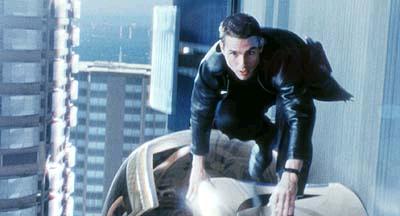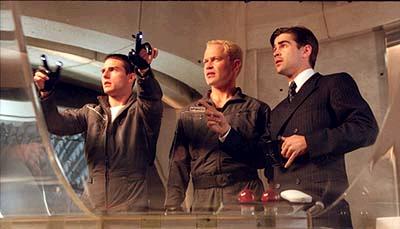

When the names Spielberg and Cruise come together in one film, it is reason to take notice. These are two of Hollywood's heaviest hitters, and the fact that they want to work together would signal that the movie they are making should be interesting. Plus, Minority Report is based on a short story by Philip K. Dick, the prolific writer who's stories begat movies like Blade Runner and Total Recall (well, Impostor too). Minority Report, a satisfying movie on many levels, lives up to its pedigree as a good sci-fi movie, a good brain teaser, and even a good look at some basic issues of right and wrong. The first striking thing about Minority Report is the look. Spielberg (A.I., Saving Private Ryan) supplements the story by envisioning an entire world of the year 2054.
In this future, the Department of Precrime and its star investigator Detective John Anderton (Cruise, Vanilla Sky, Mission: Impossible II) eliminated homicide in Washington, DC. They use precogs, humans who have the ability to see the future, to stop murders before they happen. When the precogs see the crime, the Department must quickly ascertain where the crime will take place, then they rush over to stop the murder before it happens. The system infallible, and ready for a national rollout. Ed Witwer (Colin Farrell, Hart's War, American Outlaws) is investigating the system on behalf of the Attorney General. He wants to ensure that the system is safe for national use, and is also asserting his presence. If Precrime does become national, he will undoubtedly play a large role in its deployment. Director Burgess (Max Von Sydow, Druids, Snow Falling on Cedars) and Anderton are wary of Witwer, since they don't want to lose what they in essence created.
Janusz Kaminski (A.I., Saving Private Ryan), Spielberg's frequent cinematographer, films Minority Report in muted, hazy colors, lending to an almost dreamlike appearance. Spielberg's take on Dick's future is one where Big Brother is everywhere. Giant screens project personalized commercials (as well as some blatant product placement) based on ubiquitous retinal scanners. The Department has an easy time locating Anderton because of these scanners (although why they never rescind his access to headquarters makes no sense), and Anderton gets around this in a particularly gruesome way. The precog's images project in front of Anderton, where he can "conduct" them by moving his hands, attached to controllers. The technology in the movie is advanced, but still feels within the grasp of what exists today. Cars drive themselves on highways, merging and even going up buildings.
Scott Frank (Out of Sight, Heaven's Prisoners) and Jon Cohen's script kicks into high gear when the precogs show Anderton committing murder. He has no clue who the victim is, and wants to prove his innocence. However, precogs are never wrong, so does that mean he will kill? Here lies Anderton's moral dilemma. The only way to prove his innocence is to investigate the murder, which inexorably brings him closer to the murder itself. He goes so far as to kidnap Agatha (Samantha Morton, Dreaming of Joseph Lees, Sweet and Lowdown), one of the precogs. He feels that she holds the clues to his innocence. Minority Report turns into a desperate chase. Anderton is must elude his co-workers who are trying to stop him, and at the same time solve a murder he will supposedly commit. This, and other plot points bring new doubts into Anderton's mind. Previously, he believed he was doing the right thing. However, is it right to arrest somebody for a murder they did not commit?
Cruise's presence humanizes much of the cold, mechanical feel of the movie. He may be a respected detective, but is also reeling from the death of his son years ago. Anderton seeks solace in drugs to numb the pain over his loss. Morton and Farrell also turn in good performances. For Morton, this is difficult since her character has few lines. Maybe it was the practice she had as a mute in Sweet and Lowdown. Farrell holds his own against Cruise, and now completely erases the memory of some of his more embarrassing recent work. The story becomes much more complex, but never overly so. There are three basic stories, all intertwined, with the focus on Anderton's quest to prove his innocence. Frank and Cohen do a good job of throwing out red herrings to keep the audience guessing, all the while moving quickly towards the inevitable showdown. Unlike other movies, Minority Report does have a satisfying ending, which is especially difficult given the difficulty of integrating all the plots together. Still, it is Spielberg's complete vision of the Minority Report universe that makes it a compelling watch.